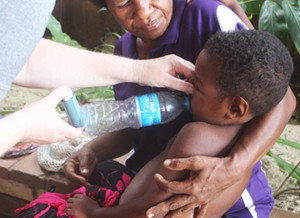Papua New Guinea (PNG) is a mere 150 kilometres (93 miles) from Australia’s northern-most tip yet the difference in healthcare between the two countries is immense.
Many Papua New Guineans have diseases that go untreated because they live in remote, almost inaccessible villages high in rainforest-wrapped mountains. However, in the past two years, Cabrini Health nurses have pushed into these villages to give the only first-world healthcare assessments that these people have ever had – and to do so they flew, trekked, paddled and climbed to reach their patients.
There are approximately 400 doctors in PNG’s 462,340 square kilometres (approximately 178,510 square miles). Only 51 of them tend to the more than 90 per cent of the population who live outside Port Moresby. Most people living in the highlands have never seen a doctor and many rarely see a healthcare worker. So in April 2016, Cabrini nurses Sue Grasby, Anne Marie Robinson, Bianca Di Sciascio and Monica Wallace left Australia for PNG with two other Melbourne nurses, each prepared to do whatever it took to improve the health outlook for those they visited. They travelled with No Roads to Health, an adventure travel company that arranges trips to remote regions for healthcare workers. The adventure is secondary to the purpose of nursing.
cent of the population who live outside Port Moresby. Most people living in the highlands have never seen a doctor and many rarely see a healthcare worker. So in April 2016, Cabrini nurses Sue Grasby, Anne Marie Robinson, Bianca Di Sciascio and Monica Wallace left Australia for PNG with two other Melbourne nurses, each prepared to do whatever it took to improve the health outlook for those they visited. They travelled with No Roads to Health, an adventure travel company that arranges trips to remote regions for healthcare workers. The adventure is secondary to the purpose of nursing.
Once in Port Moresby, they boarded a light plane to Popondetta in the north, where they collected supplies and headed for the coastal village of Buna. Buna sits at the northern entrance to the Kokoda Track and is the place at which Japanese soldiers disembarked for the protracted battle that forged an Australian legend. After a two-hour trip in the back of a truck that became bogged in mud, the nurses arrived safely at the village. This was day 44 of torrential rain for the area, rain, which continued unabated throughout their stay. Here they spent two nights in a traditional guesthouse and operated health clinics each day.
Local people trekked into in Buna from remote villages for health checks and treatment, but there had been no medical supplies delivered to the area for more than three months so distressingly, these nurses, used to modern Australian hospitals with everything at their fingertips, could only provide health assessment, professional advice and treat them with Panadol and Indomethacin, a medication used to treat pain and inflammation.
From Buna via Popondetta and a short plane trip, the next stop was Tufi, a remote town set in pristine rainforest. Topographically spectacular, this region is characterized by lofty mountains and dramatic fjords, but there was little time to admire the scenery. In five days, the group conducted eight clinics, seeing 378 people in total. This area was well provisioned with medical supplies and they had the assistance of a local health worker who rowed his canoe almost three hours each way daily to provide healthcare – mostly unpaid. He, like many of PNG’s health workers, taught our nurses as much as they taught him.
“We treated people with painful backs, knees and necks caused by their hard lifestyle; we diagnosed tropical diseases like malaria, yaws, grille, and tended febrile children, giving penicillin where necessary,” said Ms. Robinson.
During the trip, the nurses took photos for orthopaedic surgeons: two of children with club feet for possible medical evacuation, and one of a child whose fractured leg was repaired by a Cabrini surgeon who wanted a progress report.
On the final day, a man brought them his four-year old grandson. They diagnosed nephrotic syndrome, a condition of the kidneys, and arranged for him to be hospitalized. Knowing that the man was poor and far from home, the group pooled money towards the cost of clothes, food and accommodation so that he could remain with his grandson.
 Cabrini’s nurses found the Papua New Guineans to be warm, generous and grateful, smiling broadly despite deprivation and pain. This, and the unstinting hospitality they encountered, made up for the steep, treacherously slippery tracks, the bugs, spiders, lack of electricity and running water and the relentless rain. Some have already booked a return trip. “It was a wonderful way of continuing the missionary vision of Saint Frances Xavier Cabrini, the Italian Sister who founded the congregation that owns and sponsors Cabrini in Australia, by providing care to those who cannot afford it,” says Monica “To give hope that will transform people’s lives – and to do it with Cabrini’s values of compassion, integrity, courage and respect”.
Cabrini’s nurses found the Papua New Guineans to be warm, generous and grateful, smiling broadly despite deprivation and pain. This, and the unstinting hospitality they encountered, made up for the steep, treacherously slippery tracks, the bugs, spiders, lack of electricity and running water and the relentless rain. Some have already booked a return trip. “It was a wonderful way of continuing the missionary vision of Saint Frances Xavier Cabrini, the Italian Sister who founded the congregation that owns and sponsors Cabrini in Australia, by providing care to those who cannot afford it,” says Monica “To give hope that will transform people’s lives – and to do it with Cabrini’s values of compassion, integrity, courage and respect”.
